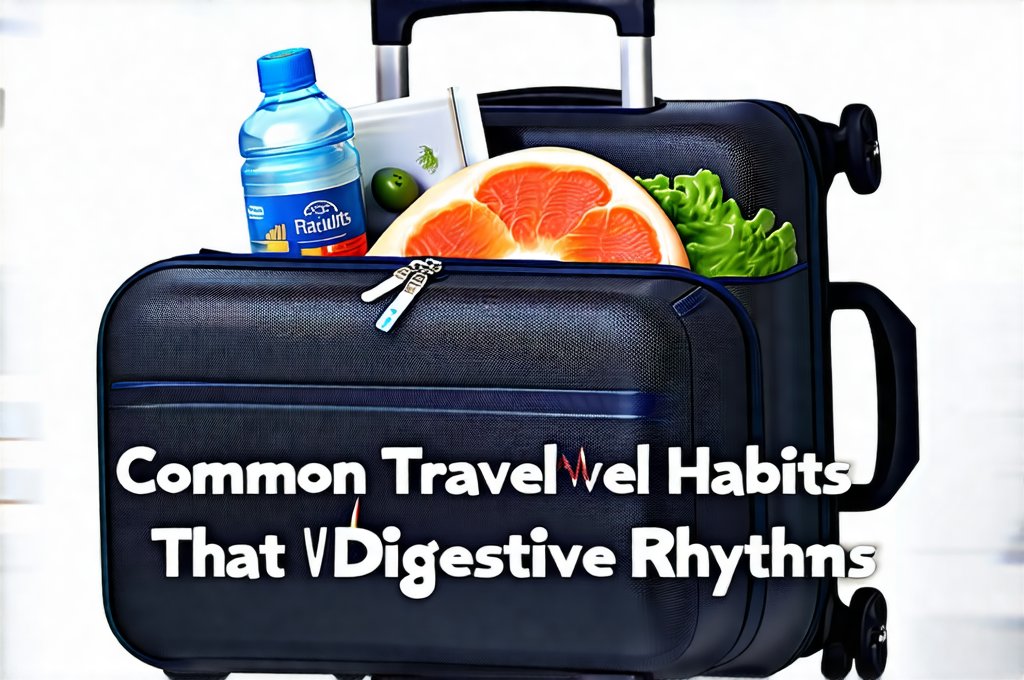Travel is often envisioned as a carefree escape – a chance to explore new cultures, savor exotic foods, and create lasting memories. However, beneath the surface of idyllic vacation photos lies a common reality for many travelers: digestive distress. From minor bloating and gas to more serious issues like constipation or diarrhea, travel frequently disrupts our normally harmonious gut function. This isn’t simply an unavoidable consequence of adventure; it’s often the result of predictable habits we adopt while traveling that unknowingly sabotage our internal ecosystem. Understanding these habits is the first step towards maintaining digestive wellbeing on your journeys and enjoying a truly comfortable experience.
Our digestive systems thrive on routine. Regular meal times, consistent dietary patterns, and even familiar surroundings contribute to a balanced gut microbiome – the complex community of bacteria residing in our intestines that plays a crucial role in overall health. Travel inherently disrupts these routines. Different time zones alter eating schedules, unfamiliar foods introduce new bacterial strains (sometimes problematic ones), and increased stress levels all impact digestive function. The good news is that many of these disruptions can be mitigated with awareness and proactive strategies. It’s about being mindful of how travel impacts your body and making informed choices to support a healthy gut throughout your adventure. You might find helpful insights in meal timing frameworks before you go.
Dietary Deviations & Food Safety
One of the most significant ways travel wreaks havoc on our digestive systems is through changes in diet. We often abandon our regular eating habits, embracing the excitement of trying new cuisines – which isn’t inherently bad, but it is different. Exotic foods can be incredibly appealing, but they frequently contain ingredients or spices our bodies aren’t accustomed to processing. This sudden shift can overwhelm the digestive system, leading to discomfort. Furthermore, food safety standards vary dramatically across countries; what is considered safe in one place may not be in another.
- Street food, while tempting and culturally immersive, often carries a higher risk of contamination.
- Buffets, common on cruises or all-inclusive resorts, can harbor bacteria if proper temperature control isn’t maintained.
- Even seemingly harmless fresh juices or salads prepared with local water sources can cause problems.
Prioritizing food safety is paramount. When venturing into new culinary landscapes: 1) Choose reputable establishments; 2) Be cautious of street food vendors (look for high turnover and visibly clean preparation areas); 3) Drink bottled water, even when brushing your teeth; and 4) Avoid ice in drinks unless you’re certain it’s made from purified water. Don’t feel obligated to try everything. It’s perfectly acceptable – and often advisable – to be selective about what you consume, especially during the initial adjustment period in a new location. Paying attention to portion awareness can also make a big difference.
Beyond outright contamination, consider the fiber content of your travel diet. Travel frequently leads to decreased intake of fiber-rich foods like fruits, vegetables, and whole grains, favoring quicker, more convenient options. This can contribute to constipation as it slows down bowel movements. Conversely, overly rich or processed foods – common on flights or during celebratory meals – can overwhelm the digestive system and lead to bloating or diarrhea. A balanced approach is key, even when indulging in local delicacies.
Hydration & Its Impact on Digestion
Dehydration is a silent saboteur of digestion, often exacerbated by travel. Airplane cabins have notoriously low humidity levels, drawing moisture from your body. Similarly, outdoor adventures in hot climates can quickly deplete fluid reserves. When dehydrated, the digestive system struggles to function efficiently. Water is essential for breaking down food, absorbing nutrients, and moving waste through the intestines. Insufficient hydration leads to harder stools (constipation) or, paradoxically, diarrhea as the gut attempts to conserve water.
- Aim to drink water consistently throughout your journey – not just when you feel thirsty.
- Carry a reusable water bottle and refill it whenever possible with safe water sources.
- Consider electrolyte replacement drinks, especially after strenuous activity or in hot weather.
- Avoid excessive caffeine and alcohol, which can both contribute to dehydration.
Electrolytes are particularly important. These minerals – sodium, potassium, magnesium – are lost through sweat and play a vital role in maintaining fluid balance within the body. Replacing them helps ensure optimal digestive function. Don’t underestimate the power of simple hydration; it’s one of the most effective ways to prevent travel-related digestive issues. Maintaining daily habits can help even when on the go.
The Role of Stress & Sleep Deprivation
Travel, while enjoyable, is inherently stressful. From navigating unfamiliar airports and languages to dealing with flight delays and unexpected changes in plans, our bodies are constantly adapting to new stimuli. Chronic stress significantly impacts the gut microbiome and can lead to a range of digestive problems including irritable bowel syndrome (IBS) symptoms, heartburn, and altered motility. The “gut-brain axis” is a well-established connection; stress directly influences digestion and vice versa.
Sleep deprivation further compounds these issues. Jet lag disrupts our circadian rhythms, impacting hormone regulation and altering gut function. Lack of sleep weakens the immune system, making us more vulnerable to infections that can cause digestive upset.
- Prioritize stress management techniques like deep breathing exercises, meditation, or yoga during your travels.
- Aim for consistent sleep patterns as much as possible, even when crossing time zones. Gradual adjustments are better than abrupt shifts.
- Consider bringing along familiar comfort items – a favorite book, music playlist, or travel pillow – to promote relaxation and reduce anxiety.
Recognizing the connection between mental wellbeing and digestive health is crucial. A relaxed mind often translates to a happier gut. Taking steps to minimize stress and maximize sleep will significantly improve your overall travel experience and protect your digestive system. Consider how movement habits can also reduce stress.
Probiotics & Prebiotics for Gut Support
Supporting your gut microbiome proactively can make a significant difference in mitigating the effects of travel-induced disruptions. Probiotics – live beneficial bacteria – help restore balance to the intestinal flora, especially after exposure to unfamiliar foods or antibiotics (which are sometimes necessary while traveling). Prebiotics, on the other hand, are fibers that feed these good bacteria, promoting their growth and activity.
- Begin taking a probiotic supplement a week or two before your trip to establish a strong foundation of beneficial bacteria.
- Continue taking probiotics throughout your journey and for a few days after returning home.
- Incorporate prebiotic-rich foods into your diet: onions, garlic, bananas, asparagus, and oats are all excellent sources.
It’s important to choose a high-quality probiotic with multiple strains. Different strains offer different benefits. Look for products that contain Lactobacillus and Bifidobacterium species, as these are well-researched and commonly found in the gut. Remember, probiotics aren’t a magic bullet; they work best when combined with healthy dietary habits, adequate hydration, and stress management techniques. It might be beneficial to explore digestive panels before and after your travels. Also review common additives that could impact your gut health.
Ultimately, a mindful approach to travel – one that prioritizes your digestive wellbeing alongside the excitement of exploration – will allow you to fully enjoy your adventures without the unwelcome disruption of gastrointestinal distress. It’s about understanding how travel impacts your body and making informed choices to support a healthy gut throughout your journey. And don’t forget digestive habits for a smoother trip!


















